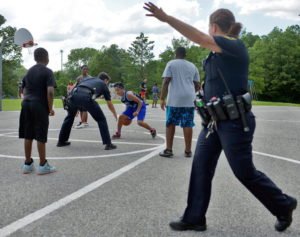Community Policing
Where to Buy Essays Online
WE WRITE ESSAYS FOR STUDENTS
Tell us about your assignment and we will find the best writer for your paper.
Write My Essay For Me| Rank | Website | Students’ Rating | Info | |
|---|---|---|---|---|
 |
GlobalEssayWriters.com
 |
Quality:10
Price:9.9
Delivery:10
|
||
 |
NursingEssayHub.com |
Quality:9.9
Price:9.8
Delivery:10
|
||
 |
ApprovedScholars.com |
Quality:9.9
Price:9.8
Delivery:9.8
|
||
Community Policing
Crime is a major cause of economic, social, psychological, and health impacts on victims and the entire community. Crime is a critical societal challenge that is detrimental to people’s and communities’ life. Response to crime has influenced the society to develop community policing as an institution where the community partners with the police to create a safe and secure environment for all.

Law and order in the society were traditionally maintained exclusively by police officers and in disregard of active collaboration with members of the society. The police faced challenges in tackling crime and were criticized for their unfriendly nature when dealing with members of the public (Mulugeta & Mekuriaw, 2017).
Community policing was established after the realization of the necessity of community partnership and involvement. Despite the establishment of community policing and a wide range of efforts by law enforcing agencies to minimize crime levels globally, social disorder and crime are still on the rise.
Signs of multiplicity and complexity of criminal acts and offenses are seen with the growing globalization, urbanization, and national development. The benefits of service learning in affecting community policing includes encouraging students to take part in their own affairs, and to stop seeing police as strangers or a problem, but see them as developmental partners.
Learners as community members should act as co-producers of quality police service and justice. Students should conduct service learning in community policing to involve the entire society, the police, and the local government to collaborate in tackling crime.
Community Policing Discussed

The policing concept has existed since time immemorial. The current role of the police is to perform community duties that were previously conducted by local citizens such as peacekeeping, dealing with family problems, conducting emergency services, and providing assistance during civil emergencies. Community policing differs from the traditional policing because the police are no longer the sole protectors of social order and the law as all members of the society are actively involved in enhancing the quality and safety of neighborhoods.
Read Other Related Essay Topics:
Cheapest Essay Writing Company
Immigrant Women and Healthcare Challenges
Community Organization
The effectiveness of community policing is determined by the perception of how law enforcers interrelate with the society and the extent to which police officers believe the public cooperates with them (Nalla, Modic & Meško, 2014). The reactive strategies of policing in the past alienated the police and citizens from one another resulting in a wide range of reforms instituted by police organizations globally to emphasize public support. The perceived attitudes by police officers on the relationship with the community members impact effective public cooperation with law enforcers and service delivery.
Community policing emphasizes on community organization as a problem-solving technique establishing a relationship between the community and police to develop a plan of action to conflict community problems. Community organization is key in allowing group cohesion and growth and builds dialogue while enhancing collaboration.
The organization facilitates consensus and participation within the community in identifying problems and developing phases of community programs as well as policies targeting crime prevention (Wiatrowski & Campoverde, 2016). A community partnership in community policing provides members of the community opportunities to take part in problem-solving and reflect at the policing process.
Cross-cultural Challenges

Policing in a multicultural society presents a wide range of issues to the police officers and the community residents. The most profound change that impact community policing in the nature of diversity, making police officers struggle with the issue of race and ethnicity. The struggles have become complex and challenging because of globalization that has increased the number of immigrants seeking religious, economic, and political freedom (Shusta, Levine, Harris & Wong, 2012).
Community policing in a heterogeneous society face considerable challenged from cross-cultural issues such as language, ethnicity, culture, and social expectations. Policing is further challenged by cultural and racial tensions and the strongly held fear and suspicion of the police officers that immigrants have from their countries of origin.
Humanitarian Considerations
Community policing has made progress in helping communities in need through social work. The police departments work in collaboration with social workers to address community issues to ensure effective intervention, prevention, and stabilization. Policing has been a critical part of social services, working alongside the enforcement of the law against offenders and victims of crimes.
Community policing also emphasize the importance of police officers remaining secure, safe, and out of harm’s way while performing their wide range of services (Lamin & Teboh, 2016).
Volunteers
Community policing has a police support volunteer program for individuals willing to spare their time in assisting the local police force supporting staff and officers. The volunteers are involved in general administrative work, manning police station front counters, and role-playing for staff and officer training.
The skilled volunteers are involved in professional work in areas such as marketing and social media, vehicle maintenance, CCTV monitoring, and criminal investigation support. Volunteering in community policing is essential in involving the public with policing and to become part of the policing family with the needs and interests of the community at heart.
Barriers to Community policing

Community policing suffers from inherent problems and limitations just like any other initiative. The main challenge is organizing community participation because it involves addressing multifaceted issues such as managing doubts, motivating community members, and harmonizing divergent interests (García Chávez, 2012).
Implementation of community policing is challenged by low awareness level of principles of community policing among members of the society and law enforcers as a result of inadequate sensitization and training. The policing is also inhibited by the accessibility to community policing resources, administrative and structural weaknesses as well as socio-cultural issues.
The policing department faces departmental challenges in hiring, recruiting, and retaining service-oriented officers. Most departments operate will a large staff shortage, some shortages being the result of budget cuts, retirement, profession, and lack of qualified candidates. Policing is also challenged by disengaged communities, inability to institute change, publics of public safety, and funding shortfalls.
Future Vision
The community policing is evolving rapidly in most police departments across the world. As leaders look and plan for the future on meeting the needs of the continually changing communities, they should work on how to collaborate with the society in addressing crime and disorder issues. The efforts should be sustained to improve the community’s quality of life over time.
Community policing can be advanced to the next level through consistent and progressive leadership. The efforts can be achieved by ensuring rank and file officers are supportive of the community policing philosophy because they are the front-line of community policing. The future of community policing can be promoted by cultivating a new generation of leaders. This can be achieved by the department taking advantage of training opportunities to improve specific skills and create leadership abilities (Diamond & Weiss, 2009).
Community policing Improvements

Community policing can be improved by addressing barriers to its implementation. The government in collaboration with non-governmental organizations should offer in-service training to law enforcement personnel in community policing (Brown et al., 2017). The capacity of the community to participate in community policing effectively should be built by the community policing forums organizing more sensation meetings to community members.
The community policing forums and police officers should be provided with adequate resources by the government in order to conduct their work effectively. Capacity building of law enforcement authorities and community forums addressing matters of community policing administration should be well facilitated by the government through training. More understanding should be created to eliminate mistrust that negatively impacts the implementation of community policing by sensitizing the government and other stakeholders on the social dynamics of the community.
Conclusion
Community policing focuses on preventing crime in collaborative efforts between the police and the society. The policing is effectively implemented when the police officers are skilled and trained to mobilize and organize members of the community to engage actively in the security issues.
The gap in the implementation of community policing can be highlighted by examining the police department’s activities and seeking local political support in ensuring an effective future of community policing. Student learners have a role to play in engaging in activities that support a broader governance approach to public safety.
Students can also engage in the policing profession to continue developing and supporting professional development through training and networking opportunities to encourage ongoing education.
Read Other Related Essay Topics:
Community policing
Let our team of professional writers take care of your essays for you! We provide quality and plagiarism free academic papers written from scratch. Sit back, relax, and leave the writing to us! Meet some of our best research paper writing experts. We obey strict privacy policies to secure every byte of information between you and us.
ORDER ORIGINAL ANSWERS WRITTEN FROM SCRATCH



